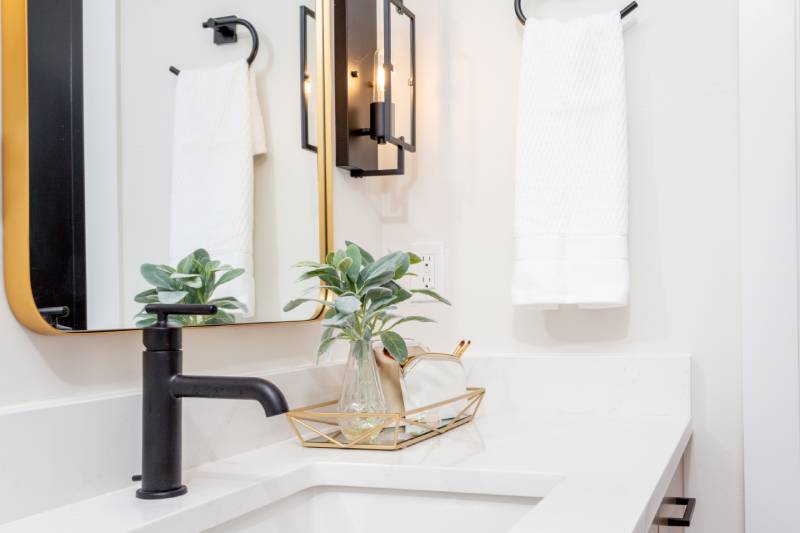
When it comes to upgrading your bathroom, the countertop material you choose plays a significant role in the room's style, durability, and functionality. Quartz and granite are two of the most popular options for bathroom countertops, each offering unique benefits and drawbacks. In this blog post, we’ll look at the similarities and differences between quartz and granite, helping you decide which material is the best fit for your bathroom renovation.
Quartz is an engineered stone made from approximately 90% ground quartz and 10% resins and pigments. This composition gives quartz a consistent appearance and makes it highly durable and non-porous, perfect for moisture-prone areas like bathrooms.
Granite, on the other hand, is a natural stone that is mined, cut, and polished into slabs for countertops. Each piece of granite is unique, featuring natural variations in patterns and colors, making it a favorite for homeowners seeking a distinctive look.
Understanding the core differences between these materials is the first step in determining which is right for your bathroom.
Both quartz and granite are durable materials, but they differ in specific aspects. Quartz’s engineered composition makes it slightly more resistant to chips and cracks compared to granite. Granite, while incredibly strong, is a natural stone and can develop minor chips if exposed to heavy impacts.
Quartz is non-porous, meaning it does not absorb water or other liquids. This makes it resistant to staining and bacteria growth, an essential feature for bathrooms. Granite countertops are naturally porous and require sealing to prevent moisture absorption.
Granite offers unique, natural patterns and variations in color, meaning no two slabs are the same. This uniqueness is a significant draw for homeowners who want a one-of-a-kind look. Quartz countertops, on the other hand, are manufactured and provide a more uniform appearance, making them ideal for modern or minimalist designs.
Quartz countertops are exceptionally easy to care for, thanks to their non-porous surface. Unlike granite, quartz never needs sealing and is resistant to stains and spills. A simple wipe with mild soap and water keeps it looking as good as new, making it an ideal choice for busy households.
As an engineered material, quartz offers endless design possibilities. With a broad selection of colors and patterns, homeowners can achieve a look that perfectly complements their bathroom decor. From sleek modern tones to bold patterns, quartz caters to every style.
Quartz’s non-porous nature ensures it remains naturally resistant to bacteria, mold, and mildew, making it an incredibly hygienic choice for bathrooms. With no need for sealing, it provides a clean and safe surface for everyday use while requiring minimal upkeep.
Granite countertops boast unique, natural patterns and colors that make each piece one of a kind. Their organic look adds timeless elegance to any bathroom, making them a particularly appealing choice for traditional or rustic designs that emphasize individuality.
Granite’s natural composition makes it highly resistant to heat, an advantage for areas where hot styling tools like curling irons or hair straighteners are frequently used. Unlike quartz, which can be damaged by high temperatures due to its resin content, granite can withstand heat without warping or discoloration, making it a durable choice for bathrooms.
Granite’s hard, natural surface is highly resistant to scratches, making it an ideal choice for busy granite countertops in Austin, TX. Everyday items like hairbrushes, razors, or jewelry are unlikely to leave marks, ensuring your countertops stay looking polished and pristine over time.
Quartz and granite are generally similar in cost, but several factors can influence the price of each. Quartz is often slightly more expensive upfront due to its manufacturing process. However, granite may require more maintenance over time, such as resealing, which can add to the overall expense. Customization, edge profiles, and slab thickness can also impact costs for both materials.
Both quartz and granite are heavy materials that require professional installation to ensure proper support and a seamless fit. Granite, being a natural stone, may have more variation in thickness, which can complicate installation. Quartz, on the other hand, is more predictable in its composition and easier to work with during the installation process.
Proper installation is crucial to ensuring your countertops last for years and perform well in a bathroom environment.
Choosing between granite and quartz countertops in Austin, TX, ultimately depends on your preferences, lifestyle, and bathroom needs. If you prioritize low maintenance, uniformity, and a wide variety of colors, quartz may be the better choice. However, if you value natural beauty, uniqueness, and heat resistance, granite could be the ideal option.
Both quartz and granite are excellent choices for bathroom countertops, each offering unique benefits that cater to different styles and functional needs. Regardless of your choice, both materials can elevate the look and feel of your bathroom while providing lasting durability.
At Fox Granite, we specialize in helping homeowners choose and install the perfect countertops for their bathrooms. Whether you prefer the sleek, modern look of quartz countertops or the timeless elegance of granite countertops, our experts are here to guide you every step of the way. Contact us today to schedule a consultation and explore the possibilities for your bathroom renovation!
